Download - Health Sciences - Curtin University
Download - Health Sciences - Curtin University
Download - Health Sciences - Curtin University
Create successful ePaper yourself
Turn your PDF publications into a flip-book with our unique Google optimized e-Paper software.
REPORT2012 INTERPROFESSIONALEDUCATION WORKSHOPS
REPORT2012 INTERPROFESSIONAL EDUCATIONWORKSHOPSBackgroundIn keeping with the Faculty of <strong>Health</strong> <strong>Sciences</strong>’goal of developing and delivering a wide range ofhigh quality sustainable IPE activities, the 2012IPE workshops provided an opportunity for studentsto engage and participate in interprofessionalcollaboration and team work while developing andsharing knowledge, skills and attributes that arenecessary for collaborative practice.IPE Workshop FormatThe expected level of participation for students waseight hours per workshop, equating to approximatelytwo hours per week over four weeks. To ensure easeof access for staff, workshop facilitators andstudents, the IPE case studies were each housedwithin Blackboard where a discussion board and acollaborative Wiki space provided the opportunity forthe creation of documentation and group discussion.Workshops were either fully online or blended (threeonline and one face-to-face session).The IPE WorkshopsFive case based workshops were offered to third andfourth year <strong>Health</strong> <strong>Sciences</strong> students during 2012.Medical Imaging students from the Faculty ofScience and Engineering also participated. Theworkshop suite was as follows:Stroke and Depression WorkshopStudents worked through a case study exploring theroles, responsibilities and competencies of eachother’s professions, identifying communicationissues for a client with complex needs, anddeveloping an integrated interprofessional care plan.This workshop, which has been delivered for severalyears now, was conducted in both Semester One andSemester Two in blended and fully online formats.Dementia WorkshopThis fully online workshop required students to worktogether through a case study, related activities inthe context of dementia care, and devise a client andfamily centred health care plan for dementiamanagement. This workshop, delivered over thepast three years, was conducted in Semester Twoonly.Working in Partnership with IndigenousAustralians to Achieve Better <strong>Health</strong> OutcomesWorkshopThis half day face-to-face workshop requiredstudents to work through a case study, identifyingkey issues and communication strategies for anAboriginal client with complex health and socialproblems. Students were required to take intoaccount the importance of cultural and spiritualinfluences on the health of Indigenous people. Thisnew workshop was conducted in Semester Two only.Dementia: End of Life WorkshopThis blended workshop required students to considerall aspects of care for a client with dementiareaching the end of their life. <strong>Health</strong>, social, legaland ethical considerations were covered. This newworkshop was conducted in Semester Two only.Dementia: Cultural and Linguistic ChallengesWorkshopThis blended workshop required students to workcollaboratively to develop an integratedinterprofessional care plan while considering thepotential impact of cultural diversity (in the contextof dementia care) on key stakeholders in healthservice delivery. This new workshop was conductedin Semester Two only.Workshop RegistrationsWorkshop information and registration details weredistributed to teaching staff and students (throughDirectors of Teaching and Learning). They were alsopromoted on the Faculty website. Studentparticipation in the workshops was linked to a rangeof units hence, required some students to completespecific assessment requirements.Students registered online indicating their first threeworkshop preferences. Every endeavour was madeto allocate students to their workshop of preference.Students were manually allocated to each Workshopto ensure a range of disciplines across groups. Eachstudent group was also allocated a workshopfacilitator on a 1:30 ratio . Workshop Facilitatorscame from the areas of Nursing, Dietetics,Physiotherapy, Social Work, Pharmacy, SpeechPathology, Occupational Therapy, <strong>Health</strong>Information Management and Psychology, andMedical Imaging Science.Student Participation266 students participated in Semester OneWorkshops and 772 students in Semester Two,resulting in 1038 students across 2012. Abreakdown of these results is shown in Tables 1 and2, over.
REPORTTable 1. Semester 1 2012 IPE Workshop breakdown.DISCIPLINEStroke and Depression(Blended)Stroke and Depression(Online)TOTALPhysiotherapy 4 53 57Occupational Therapy 12 69 81Nursing 22 77 99Dietetics 28 1 29TOTAL 66 200 266Table 2. Semester 2 2012 IPE Workshop breakdown.DISCIPLINEStroke andDepression(Blended)Stroke andDepression(Online)DementiaWorking inPartnershipwithIndigenousAustraliansto AchieveBetter<strong>Health</strong>OutcomesDementia:CulturalandLinguisticChallengesDementia:End of lifeTOTALPhysiotherapy 2 29 21 7 1 1 61Pharmacy 27 62 - - - - 89Nursing 8 77 43 18 5 10 161Social Work 41 - - - 30 - 71Psychology 16 11 28 15 2 2 74LaboratoryMedicine - 32 - - - - 32OccupationalTherapy 26 30 14 2 2 3 77<strong>Health</strong>InformationManagement- - 39 - - - 39Medical ImagingScience 6 13 29 6 5 1 60Speech Pathology- 47 45 - 13 3 108TOTAL 126 301 219 48 58 20 772
FacilitatorsWorkshop facilitators were primarily sessional stafffrom within various schools. A breakdown offacilitators for each discipline can be seen in Table 3,below. Note: A number of facilitators participated inmore than one workshop and in both semesters.Facilitators were offered a face-to-face session oronline training module to assist them in workshopfacilitation. Due to low facilitator numbers,additional facilitators from Public <strong>Health</strong> wererecruited in Semester Two.“Students were strongly influenced by the videos ofyoung stroke victims. This is a powerful tool toencourage patient empathy and to show the needfor interprofessional cooperation”.“Being my first experience with IPE workshops, I wasglad to have met the organisers and some otherfacilitators in the initial meeting. It gave me a goodidea of what to expect and boosted my confidence.Staff materials such as the facilitator’s handbookare also well presented”.“I did have a sense that the participation overall wasmore balanced this year and that there was betterTable 3. Semester 1 and 2 (Combined) Facilitator breakdown.DISCIPLINE TOTAL NUMBER OF STUDENTS NUMBER OF FACILITATORSPhysiotherapy 118 7Pharmacy 89 2Nursing 260 2Social Work 71 2Psychology 74 2Laboratory Medicine 32 1Occupational Therapy 158 6<strong>Health</strong> Information Management 39 1Medical Imaging Science 60 3Speech Pathology 108 2Dietetics 29 1Public <strong>Health</strong> - 5Indigenous Facilitators - 6TOTAL 1038 40Evaluation / FeedbackUnit Coordinators and Workshop Facilitators wereinvited to provide feedback on the workshops andworkshop processes either through a feedback formor by attending a workshop review meeting. Thesetwo sets of feedback are summarised below.Facilitator Feedback (via emailed form)What aspects of the workshop did you feel wentwell?“The students were very motivated to participate inthe workshop. Most students really engaged in theactivities without need to encourage them torespond. They all seemed very respective of otherprofessions and open to learn”.“The opportunity for students to come together tointeract and discuss the subject appeared to bebeneficial for student learning”.“Students began enthusiastically. The introductionseems to be motivating and well explained. Therewere very few questions regarding expectations orwhere to find components of the program”.representation across disciplines in the End of Lifecase study. Having said that, it would have beenreally valuable to have had Social Work studentsinvolved in the End of Life case study – but Iunderstand the reasons for why this wasn’t possiblethis year”.“Having facilitated the Dementia case studies overthe past few years I definitely think the face to facesession has improved the experience for students. Ithink that this was a really useful session for themand completion of the care plan was much morecollaborative, integrated and successful ascompared to this exercise in previous years (wherecompleted fully online). As such, I would recommendmaking all of these case studies blended and notoffering any in fully online mode”.What aspects of the workshop do you feel couldbe improved? How?“The way the students worked together on theassignments. Some assignments made it very easyfor the students to do their own thing, without
REPORTlooking at what others had already put on thediscussion board. It sometimes seemed like theywere doing individual assignments, instead ofworking together on it as a group, adding to eachother’s posts. It would be great if the students wouldhave responded more to each other, asking eachother questions to learn from each other and therebyworking towards one goal together. I think differentassignments (or even just different phrasing of theassignments) could facilitate this”“I had three groups and some of the tasks meantchecking up to 90 individual student postings whichwas quite a challenge, especially as a number ofstudents required contact from me”.“I’m still a little unsure of how much involvement isexpected from facilitators regarding the actualcontent of the workshop. It would be good to seesome examples showing what is expected”.“Several students maintained a habit of earlycontributions but about half of one group of studentswere contributing late on the evening of the deadlineby week 2. This unfortunately continued to the endof the workshop in spite of several reminders, muchto the frustration of one group member. I’m not surethat there’s an easy answer to this”.“Three students in various groups madecontributions after the due date both to the WIKI andto several of the activities…Is it possible to limitaccess to the WIKI after the deadline?”“There was little actual discussion among students,though many expressed their agreement with others.It is not clear whether all students actually readother students’ work. A layout such as facebook,where comments can be added beneath an initialcontribution and all seen at once (and ‘liked’ oragreed/disagreed) would be more conducive todiscussion”.“The WIKI was problematic again. It would be goodto explore alternative options to the WIKI for groupcollaboration”.Any other feedback or suggestions?“I think it’s a great initiative, and it is good to seethat the students are enthusiastic about it as well”.“I was asked to undertake the work at a late stageand being new to the workshop, I think thefacilitator’s workshop would have been very usefulfor me”.“Comments from students indicate that they foundthis workshop a valuable experience, though severalmentioned the difficulty of discussing in an onlineenvironment”.“While I know that the dementia “content/theory”isn’t as much of a focus as the IPE experience itself, Ithink the students would have benefited from somemore information about dementia / end of life care.There were lots of questions from students about thenatural dying process (which was referred to in oneof the video clips). This might include further links todementia information / articles as part oforientation or the Week 1 activity. Similarly,students were very interested in euthanasia /relevant legislation in Australia – so additional linkscould be provided or worked into activities /discussion”.“Having the week 4 activities in the final week ofsemester may not be ideal and may reflect the dropoff in participation / completion of activities in thefinal week. A number of students did comment atthe face-to-face session (week 12) that it was a verybusy point of semester”.Unit Coordinator and Facilitator Workshop ReviewMeetingWhat aspects of the workshop did you feel wentwell?Learning Process and Materials (Topics covered;Expectations of the students; Format; Assessment;Student Experience and Learning)The new start time/deadline for studentparticipationThe face-to-face explanation of the workshops tonursing students was very helpfulStudents valued face-to-face contactThe addition of an activity to establish the grouprules was effectiveThe face-to-face stroke workshop was significantlybetter than previously – students had more controlof the learning experience and were more selfdirectedScenarios were enjoyed by the nursing studentsand the workshops aligned well with the unit theywere embedded in.Technology (Blackboard; Wiki)The Blackboard structure/format was significantlyimprovedThe WIKI was much easier to use
Process Management / Delivery (Understanding ofown and other’s roles; Communication; Role ofFacilitator’s, UC’s)All involved reported more clarity on their roles andresponsibilities following the provision of clearinformation on theseThe facilitator spreadsheet and Unit Coordinatorscontact list were useful resourcesFeedback provided on each workshop and eachactivity, to the Unit Coordinators, was very usefulWhat aspects of the workshop do you feel couldbe improved?Learning Process and Materials (Topics covered;Expectations of the students; Format; Assessment;Student Experience and Learning)Change the stroke case study from a diagnosis ofstroke to presenting key symptoms onlyReview activity 1.3 and week four activities as anumber of students did not complete these in eachworkshopThe value of writing a care plan low for somedisciplinesStudent contributions to the care plan were difficultto trackStudents appeared to be uncomfortable incorrecting each other online e.g. correctingerroneous information about their own professionLearning outcomes should include improvingothers’ knowledge of their own professionExternal nursing students would like some face-tofaceinteractionTechnology (Blackboard; Wiki)Investigate the use of performance dashboard toassist workshop facilitators in managing onlinestudent contributionsProcess Management / Delivery (Understanding ofown and other’s roles; Communication; Role ofFacilitator’s, UC’s) Nil providedAny other feedback or suggestions?Colour coordination of WIKI entries to make eachstudent’s contribution clearFace-to-face care plans were higher quality thanfully online care plansImplement edited care plan rather than care plansin a WIKIContinue to encourage students to meet face-tofaceSome groups interacted outside of the discussionboard via email and cc’d the facilitator into thisPrompting students for contributions, by email,worked particularly well in the first two weeks butwas less effective after that timeProject Manager Michelle Donaldson andInstructional Designer Leah Irving were “fantastic”and were critical to the success of the workshopimplementationThe provision of PowerPoints, assistance with theset up and catering for face-to-face sessions wasvery goodSmaller groups i.e. eight students were easier tomanage than the usual group size (10 students)Need to review which unit/s the workshops areembedded in within pharmacy as they have verylittle on campus time in their final year of theundergraduate program. Pharmacy students needa briefing prior to the workshop commencing tofacilitate the link to practiceRestructure the activity of correctingmisconceptions of own profession to ensure this isundertaken and that responses are accurateConsider presenting symptoms, students formdiagnosis and then “find” the role of their ownprofession with that scenario (likened to a Where’sWally? activity)New to 2012 - Indigenous WorkshopThe Working in Partnership with IndigenousAustralians to Achieve Better <strong>Health</strong> OutcomesWorkshop was designed and delivered for the firsttime in 2012 and all students were invited tocomplete a formal evaluation.A total of 47 out of the 48 participants completedthe questionnaire. Students were very positive aboutthis learning experience with the vast majority ofstudents agreeing or strongly agreeing that theworkshop was well structured, the case study wasvaluable, that they learned about IPE and how towork both in partnership with Aboriginal Australiansand with students from a range of disciplines.Figure 1, overleaf, shows the participants’ levels ofagreement with each evaluation question. Moredetailed information, including a quantitativeanalysis of responses to each question, is shown inTable 4, overleaf.
REPORTFigure 1. Indigenous Workshop: Participants’ level of agreement with each evaluation question.Table 4. Results of the Indigenous Workshop Evaluation.Question1 I was provided with sufficient information to participate actively in thisworkshop25 th75 thIQR% %Min Max1 3 4 2 42 The instructions provided were adequate to meet my needs 1 3 4 2 43 Expectations of my participation were clearly specified 1 3 4 2 44 I was able to access the materials in the week one with little difficulty 1 3 4 2 45 The structure of the workshop was easy to follow 1 3 4 2 46 The authentic case study contributed to the affective appeal of the1 3 4 2 4workshop7 The web based learning environment held my interest in the week one of 1 2 4 1 4the workshop8 I was provided with sufficient time to complete the learning activities 1 3 4 2 49 My understanding of IPE increased as a result of this workshop 1 3 4 2 410 My knowledge of strategies to facilitate working in partnership with1 3 4 2 4Aboriginal Australians increased as a result of the workshop11 I have greater awareness of the factors to be considered when working with 1 3 4 2 4Aboriginal Australians12 I was able to learn about other student's roles and responsibilities 1 3 4 2 413 I was able to learn about other students' perspectives on the subject matter 1 3 4 2 4of the workshop14 It was easy to work collaboratively with the other students involved in my 1 3 4 2 4group in this learning environment15 During the workshop I developed skills in joint planning and decision1 3 4 2 4making with other health professionals16 The role of the facilitator was clearly specified 1 3 4 1 417 The facilitator's input added value to my learning 1 3 4 2 418 I felt a sense of satisfaction and achievement about this learningenvironment19 The workshop was a valuable learning experience that will enhance myfuture practice1 3 4 2 41 3 4 2 41=Strongly disagree, 2 = Disagree, 3= Agree, 4= Strongly Agree
The most negatively rated item, while still beingpredominantly positive, was item 7, concerning webbased learning. This showed both markedly lowerstrong agreement and the greatest numbers ofstrong disagreement. The other item to featurestrong disagreement, although only a singleparticipant responded thus, was item 16, concerningthe clear definition of the facilitators role. This isnotable because it was the only other item with arating of strong disagreement.Students provided a number of positive qualitativecomments and suggestions for improvement.PositivesGeneral positive comments“I really enjoyed this session and found that bothadded to and cemented my knowledge.”“I really enjoyed the experience and thought it wasreally well done! Thanks.”“Thank you for organising it.”FacilitationThe most common positive feedback centred aroundthe facilitation and facilitators of the workshop,describing them positively as knowledgeable,friendly, experienced.In addition to this, however, one very importantaspect that many participants raised was the valueof being engaged with Aboriginal healthcare workersand an Aboriginal Liaison Officer that could speakwith genuine authority and from first handexperience.“Have a real-life case study of which the facilitatorhad been involved in and could clearly explain whathad occurred. ““Having Dennis (Aboriginal Liaison Officer) availableto provide first-hand experience from the casestudy.”“Hearing from Aboriginal people regarding theirperspective, learning about working with Aboriginalpatients.”“Hear it from experienced healthcare workers alsohelp give insight into what we need to be aware ofwhen working with Aboriginal patients and people ingeneral.”Collaboration and CommunicationAnother very common positive point was the valuethe participants felt in being able to communicateand collaborate with a variety of professionals, andbe exposed to a variety of viewpoints. This wasparticularly relevant in the context of the case study.“Very informative and helpful experience both inregard to interpersonal collaboration and indigenoushealth care.”“Input from students from different professions andcultural background.”“I enjoyed the opportunity to work with other healthprofessionals.”“Hear about other healthcare professional’sperspectives on situations and also learning aboutinformation from facilitators and speakers.”Suggestions for improvementCase study did not engage all the professionsThe most frequent criticism was that the particularcase study, though highly relevant in terms ofcultural Indigenous healthcare, was not relevant to anumber of the professions there, and contained onlyissues that participants felt were outside of theirprofessional remit. This was particularly the casewith medical imaging students. This criticism alsorelates to suggestions addressed later in theanalysis that suggested a greater variety of casestudies.“I felt that this session didn't really incorporate myprofession although I can see how it was very usefulfor other professions.”“IPE should include more different professions in itsgroup e.g. social workers, physiotherapist, dietician,medical officers.”“[Wishes that] this case study contained moreissues about health so medical imaging students canshare their professional roles.”“I felt that my own profession – radiography – waspretty much irrelevant to the case presented.”More ContentIn conjunction with the previous criticism, severalparticipants suggested that more content wouldhave been desirable. These requests tended to be forone of two kinds of content. Firstly, a number ofparticipants felt that more background informationsuch as extended information on the historicalperspective or cultural practices would have madethe discussion and presentation easier to follow andengage fully with. Secondly, participants indicatedthat a variety of case studies would have beenbeneficial, particularly if these other case studiesincluded complications that involved a greatervariety of professions, so as to allow professionsthat felt irrelevant in the primary case study toengage.“Possibly some readings/background on Aboriginalculture. More information in case study e.g. defacto’s culture, children's feelings of de facto. Thiswill reduce amount of off-topic talk.”
REPORT“Maybe providing some sort of link or informationabout working with Aboriginal communities or anAboriginal based healthcare communities.”“There might be a time issue with it but maybe haveanother case study to make comparison on what canbe done in various situations.”“Wider range of case studies would give a broaderpicture to different cultural issues involved inindigenous health care.”Session Too LongFinally, some participants felt that the sessions weretoo long, and that it became difficult to remainfocused and motivated throughout them. It shouldbe noted that this was brought up relatively fewtimes, but still represented a concrete complaintshared by a few participants.“May have been stretched out a bit too much inrespect to time – often lost interest or became tired.”“Length of the session – difficult to maintainconcentration and enthusiasm for such a long periodof time.”RecommendationsA number of important lessons were learned fromthis exercise which will assist in refining theworkshop process for 2013. The wide range ofpositive feedback indicates that the implementationof the IPE Workshops have overall been well receivedthis year.To further improve the IPE Workshop experience forstudents, the IPE team continually review andidentify areas that could be improved and aremoving forward on issues such as:Refinement of the online student registration formImprovement of the information package forfacilitatorsImproved online instruction/structure for bothstudents and facilitatorsFurther streamlining of criteria for discussions sothat all students are aware of what is expected ofthem and facilitators can provide objectivefeedbackContinued promotion of the IPE Workshops toSchools to encourage embedding of theseexperiences into units to ensure buy-in byfacilitators as well as studentsContinued targeting of sessional staff asfacilitatorsClearer articulation of learning outcomes andassessment tasks for students and staffModify the study for the Indigenous workshopProvide examples of good and poor contributionsfrom both students and facilitatorsImprove the facilitator payment processAcknowledgementsThe ongoing success of these workshops is the resultof the contribution of many people:The Unit Coordinators, the IPE team and theDirectors of Teaching and LearningThe most critical factor was the contribution of theworkshop facilitators:Semester 1: Peter Gardner, Sharon Keesing, IngridRoche, Claire Morrisby, Stephanie Parkinson, HayleySherratt and Jessica Vinci.Semester 2: Stephanie Parkinson, Sharon Maresse,Ingrid van Zyl Brooks , Sharon Keesing, JudiAnderson, Jade Cartwright, Kerryn Butler-Henderson,Sue Gillieatt, Claire Morrisby, Megan Tulk, KatePovee, Lydia Timms, Tracy Redwood, Sheel Gor, HoeLee, Belinda Kerr, Denise Robinson, Gae Ellison,Benjamin Devine, Rainee Schupelius, AmeeBosenberg, Joanna Stewart Priestly, LindaPannekoek, Belinda Kerr, Dennis Kickett, TonyKickett, Louise Austen, Karen Reys, Rosemary Roeand Julie Owen.And finally, to all the students that participated inthe 2012 IPE Workshops.AuthorsThis report was compiled by Michelle Donaldson (IPEWorkshop Coordinator), Margo Brewer (DirectorInterprofessional Practice), and Lorenz Wolf(Research Officer).<strong>Curtin</strong> <strong>University</strong>,December 2012.
For more information contact:Faculty of <strong>Health</strong> <strong>Sciences</strong><strong>Curtin</strong> <strong>University</strong>Kent Street Bentley WA 6102GPO Box U1987 Perth WA 6845Tel: + 61 8 9266 9289Email: HlthSci-IPE@curtin.edu.auDisclaimer and copyright information:The information in this publication was correct at time of printing.However, <strong>Curtin</strong> <strong>University</strong> reserves the right to make changes as appropriate. The <strong>University</strong> makes no warranty, representation or undertaking,whether expressed or implied, nor does it assume any legal liability, whether direct or indirect, for the accuracy, completeness or usefulness ofinformation contained in this brochure.© <strong>Curtin</strong> <strong>University</strong> of Technology 2012.This publication is protected by copyright. Apart from limited exceptions as permitted by the Copyright Act 1968 no part may be reproduced orcommunicated by any means without express written permission.<strong>Curtin</strong> <strong>University</strong> is a trademark of <strong>Curtin</strong> <strong>University</strong> of TechnologyCRICOS Provider Code 00301J (WA), 02637B (NSW)


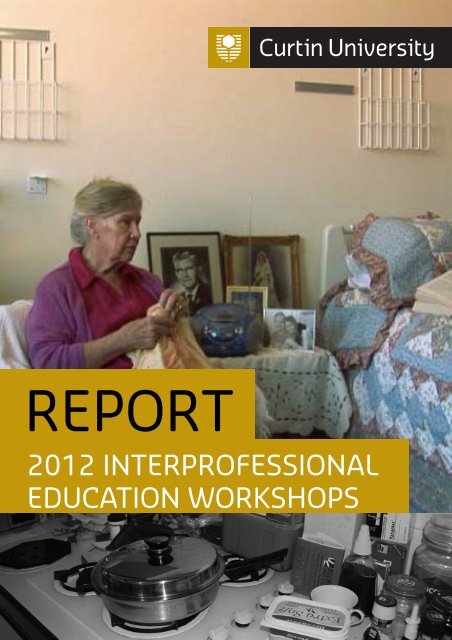
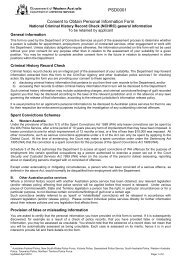
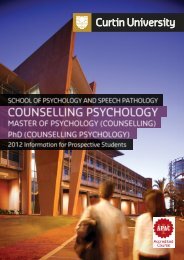
![Mental health commission report July 2010 - June 2011 [.pdf]](https://img.yumpu.com/50755705/1/184x260/mental-health-commission-report-july-2010-june-2011-pdf.jpg?quality=85)
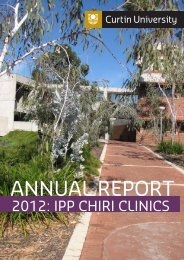
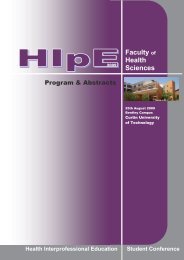
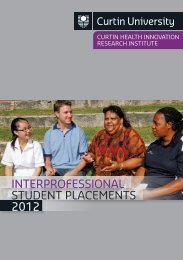
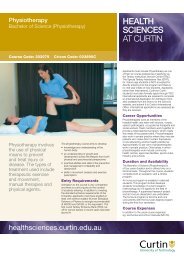
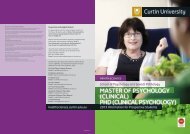
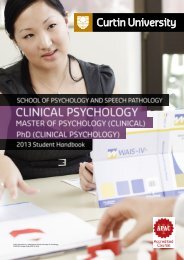

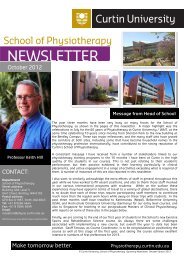
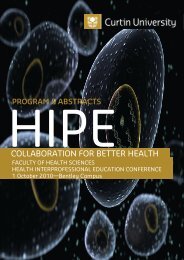
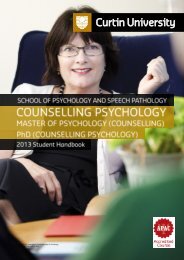
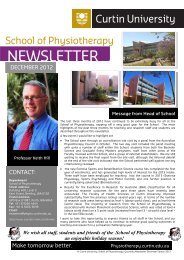
![2007 Annual Report [.pdf] - Health Sciences - Curtin University](https://img.yumpu.com/44476724/1/184x260/2007-annual-report-pdf-health-sciences-curtin-university.jpg?quality=85)